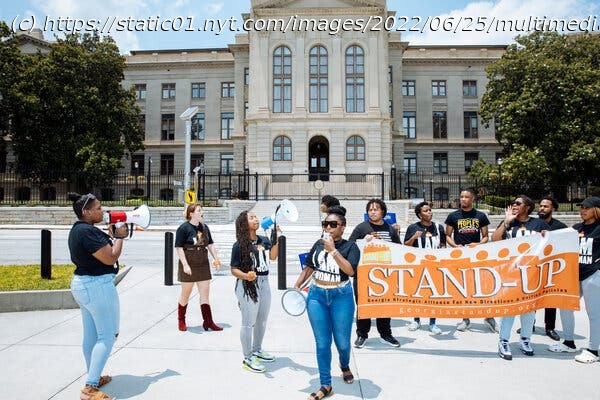The Supreme Court’s decision to overturn Roe v. Wade shifted the abortion fight to state legislatures, where gerrymandering has given Republicans an advantage.
In his concurring opinion to the Supreme Court’s decision to overturn Roe v. Wade, Justice Brett M. Kavanaugh struck a note of optimism that democracy and the will of the people would prevail, even on the agonizing issue of a woman’s right to end a pregnancy.
“The nine unelected Members of this Court do not possess the constitutional authority to override the democratic process,” he wrote, adding that the court’s decision merely “restores the people’s authority to address the issue of abortion through the processes of democratic self-government.”
States, in other words, hold the power. For Democrats, that is extraordinarily bad news: In many states, including Wisconsin, Ohio, Georgia and Florida, abortion’s new battleground is decidedly unlevel, tilted by years of Republican efforts to gerrymander state legislatures while Democrats largely focused on federal politics. As abortion becomes illegal in half of the country, democratic self-governance may be nearly out of reach for some voters. By neutralizing federal rights and powers, the Supreme Court is turning states into battle zones. That goes beyond abortion and includes voting, immigration and civil rights. And if, as expected, the court restricts the federal government’s ability to regulate carbon dioxide, state governments, stepping in for a gridlocked Congress, will be left to address climate change as well. That would leave the future of the fight to lawmakers in places such as Sacramento and Oklahoma City. Even as leaders of conservative advocacy groups celebrated a landmark victory on Friday decades in the making, they said that they were already gearing up for the next phase of the battle in statehouses and state Supreme Courts. Thirteen states have so-called trigger laws designed to effectively ban abortion in the wake of the Supreme Court ruling overturning Roe v. Wade. Others could look to strike the right to abortion from state constitutions. And still others, like Michigan and Wisconsin, have old laws predating Roe that ban abortion and that abortion rights advocates and political leaders are now trying to block.
“There is definitely going to be a lot of action in the states,” said Carrie Severino, the president of the Judicial Crisis Network, a conservative legal advocacy group that has helped elevate Republican judges. “The challenge is which states are going to have state courts that are likely to be well to the left of the people.”
Democrats may have won the popular presidential vote in five out of the last six elections, but Republicans control 23 state legislatures while Democrats lead 14 — with 12 bicameral state legislatures divided between the parties. (Nebraska’s legislature is elected on a nonpartisan basis.)
In a very real sense, the country is pulling apart, with blocks of liberal states on the West Coast and in the Northeast moving ahead with one agenda as the conservative center of the country moves in the opposite direction. State compacts on the coasts, for instance, have moved forward to stem emissions of climate-warming pollution while fossil fuel-dependent states in the center press for more production of oil, gas and coal.






